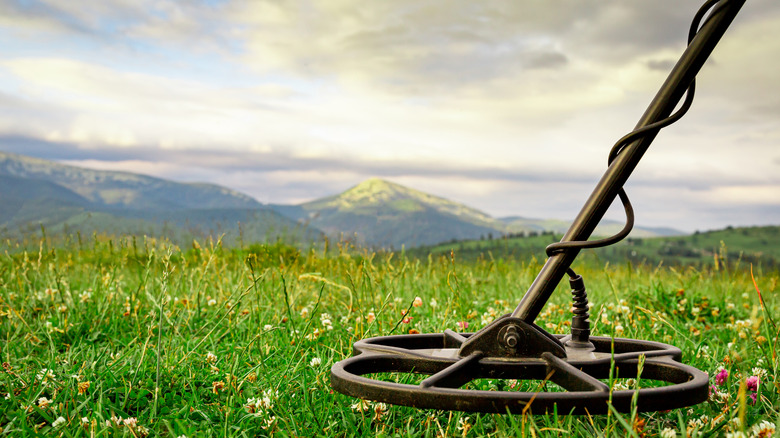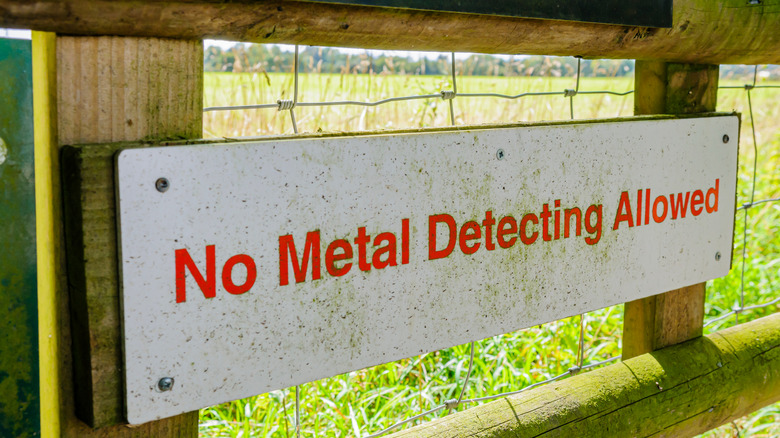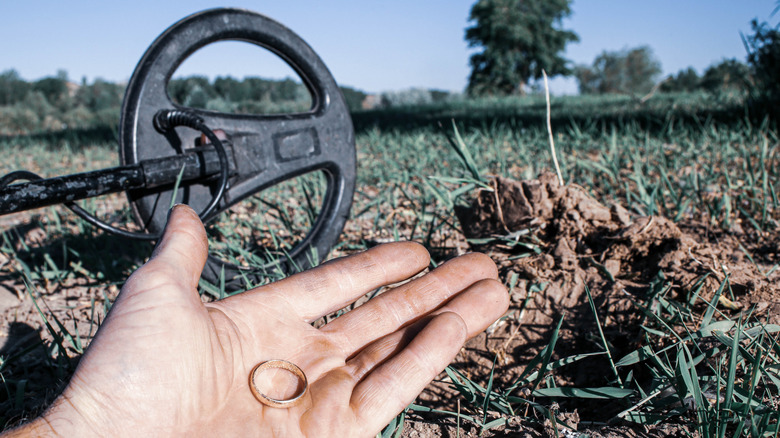Things You Should Know Before Using A Metal Detector
There's often history just beneath your feet, waiting to be discovered. A long-forgotten button, an antique coin, or even a remnant from one of the wars that shaped our country. Trying to unearth these treasures can be a fun hobby or adventure for people of all ages. Metal detecting also gets you into nature and away from the daily doldrums of life, and your screens. It doesn't take a high degree of skill to get started, though you may have to refine your technique to successfully dig up meaningful finds. Like many hobbies, however, there are some ins and outs that you should learn before digging the dirt.
There are different types of metal detectors available, so you'll want to find the best one to suit your needs. Metal detectors are sold at places like Harbor Freight, Amazon, and even sporting goods stores. You'll have to learn the proper technique: Remember that swishing motion you've seen people use on TV, and understand the different beeps and alerts that your metal detector may produce. You may want to do some research on the best spots to go detecting, beyond your backyard. Most importantly, however, you must learn where it's permissible to detect and dig, and when you should leave the trowel in the car.
Top spots, and rules and regulations
Beginners in the world of metal detecting may want to start in their own backyard and branch out once they've gotten the hang of this new hobby. It's best to find places that historically have a lot of foot traffic and where people have been settled for a long time. Public parks, beaches, fields, fairgrounds, old houses and even churchyards can be a jackpot of finds, though you may have to dig up a few bottlecaps before finding anything of note.
Research is a must before you venture off your own property. Laws vary from state to state, but metal detecting is illegal in all parks that are managed by the National Park Service under the Archaeological Resources Protection Act. In fact, you're not even allowed to have a metal detector in your vehicle when you visit a national park. The use of metal detectors in state parks varies by state, by park, and even time of year. Be sure to investigate your state's regulations or the park's website before you go.
If you plan to try detecting in a city park, check your local regulations, and never metal detect on private property without first seeking permission from the landowner. If you're an avid flyer, you'll have to check your metal detector, as they are banned as a carry-on item. When the fun is over, fill in all the holes you've made and leave the area as you found it.
Tips to get started
You may only be familiar with metal detecting through the History Channel's popular reality show "The Curse of Oak Island." For the detecting hobbyist, there are two main types of metal detectors: Very-Low Frequency, or VLF, detectors use a low-frequency electromagnetic field to detect metal. They're great if you're hunting for coins, copper objects, jewelry, and gold. These are the most common types of metal detectors and are lightweight and affordable. Some models have settings that allow you to ignore unwanted types of metal. Pulse induction (PI) metal detectors work differently, sending pulses into the ground and then measuring how long it remains before fading. They work well for deep detection and in highly mineralized ground, but tend to be heavier and more expensive.
When you're shopping for a metal detector, consider your needs and set a budget. Is this just a casual hobby or will you spend hours every weekend seeking treasure? You'll also need some accessories like a digging tool and headphones. Once you've purchased a metal detector, read the instructions closely. Getting started may be easy, but finding something beyond scattered nails will likely take time and patience.
Lastly, remember to check those federal, state, and local laws, and be aware that rules can extend beyond where you can dig. These rules may even dictate what types of tools you can or cannot use. Adventure and discovery awaits if you follow the rules, but you may otherwise face fines or even trespassing charges.


